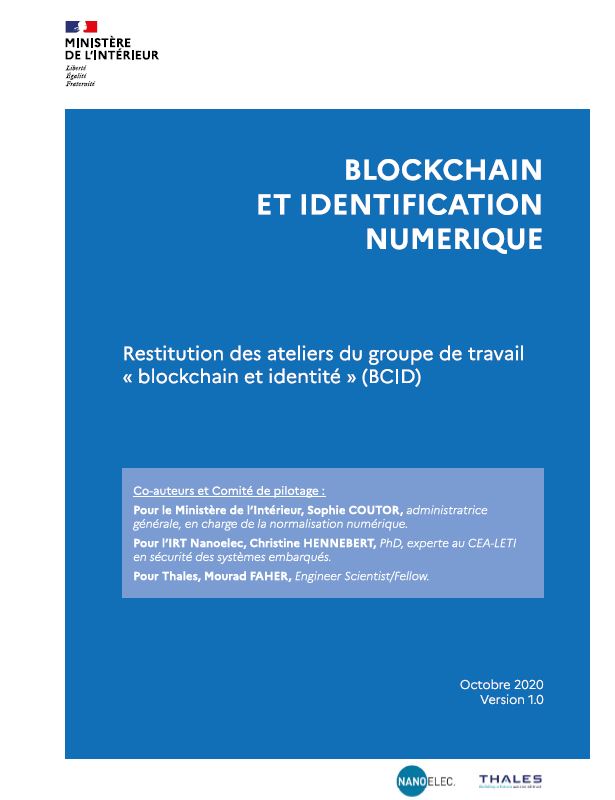The French Ministry of the Interior and IRT Nanoelec with CEA and Thales publish a joint White Paper investigating the future prospects for Blockchain technology, notably with respect to Digital Identity management.
 Digital identity lies at the heart of trust in the digital economy: while it is essential in ensuring secure transactions, we know that the possession of users’ personal data is also one of the bases of the economic model of the web giants. For its part, the State is permanently looking to adapt its identity ecosystems to the challenges of privacy protection1, compliance with new anti-fraud regulations, as well as the prevention of theft and impersonation.
Digital identity lies at the heart of trust in the digital economy: while it is essential in ensuring secure transactions, we know that the possession of users’ personal data is also one of the bases of the economic model of the web giants. For its part, the State is permanently looking to adapt its identity ecosystems to the challenges of privacy protection1, compliance with new anti-fraud regulations, as well as the prevention of theft and impersonation.
The concept of Self Sovereign Identity (SSI), sometimes referred to as “informational self-determination”, is an interesting potential solution for meeting these challenges in the future. It is implemented by means of an intrinsically secure blockchain and could offer everyone the opportunity to possess and control the elements concerning the digitization of their identity attributes, with no intervention from a body centralizing the data for access to a service, as demonstrated by the authors of the “Blockchain & identification numérique” (Blockchain and digital identity) White Paper published by the French Ministry of the Interior and IRT Nanoelec, with CEA and Thales, which comes out this month2.
Even if the precise uses of this technology have yet to be defined, the White Paper contributes to defining the possible outlines. It is thus a part of the essential prospecting work.
Through seven use cases, ranging from the production of unfalsifiable official personal documents to management of energy self-consumption in a joint ownership building, the White Paper explores the answers that a blockchain could provide to the trust and facilitation questions created by the digitization of our daily lives.
The authors state that “in many cases, the use of a blockchain in addition to other infrastructures […] could help separate identification from authentication.”
The White Paper suggests the joint implementation of a number of measures by the public authorities and private companies, with the assistance of standardization bodies and research centers. Its authors recommend an approach which could envisage blockchain qualification as a trusted service by the European authorities, in conjunction with the European Blockchain Services Infrastructure (EBSI)3 project.
- Read the “Blockchain & identification numérique” White Paper (in French) here.
- In accordance with European regulations, see GDPR
- The “Blockchain & identification numérique” White Paper, published by the French Ministry of the Interior, is co-authored by Sophie Coutor, General Administrator and head of the Digital Standardization Unit at the Ministry of the Interior, Christine Hennebert, cybersecurity researcher at CEA-Leti within IRT Nanoelec, and Mourad Faher, standardization engineer at Thales. It is based on the work by the “blockchain and identity” (BCID) working group comprising experts from the public and private sectors in the legal, citizen and consumer services, security, cybersecurity and digital innovation fields.
- The European public sector plays a pioneering role in the Blockchain by building its own basic Blockchain infrastructure for public services, with the goal of making it interoperable with private sector platforms. This is the European Blockchain Services Infrastructure (EBSI). https://ec.europa.eu/digital-single-market/en/european-blockchain-services-infrastructure?etrans=fr




